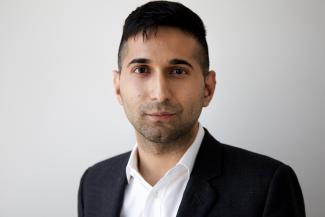
Dr. Yuvraj Joshi is an expert on constitutional and comparative law, racial equality law, gender and sexuality law, and human rights, and we’re thrilled to welcome him as our newest faculty member. In July 2021, he joined the law school as an assistant professor.
Dr. Joshi has conducted research and advocacy work for organizations including Human Rights Watch and the Lambda Legal Defense and Education Fund. His publications include articles in several US law reviews, as well as commentary in The Washington Post, Slate and Teen Vogue. Dr. Joshi is a Fellow of the Harvard Carr Center for Human Rights and a Faculty Affiliate at the UCLA Promise Institute for Human Rights. He received his doctoral degree in law from the Yale Law School, where he was a SSHRC Doctoral Fellow, a Yale ISPS Policy Fellow, and a Gruber Fellow in Global Justice.
We spoke with Dr. Joshi about his current research and why he’s excited to be teaching the upper-year seminar Law and Inequity this fall.
What are your research interests?
My research focuses on how the law promotes and impedes the pursuit of social justice. From working on human rights issues, I know that the law is both a solution to and a source of oppression. In choosing my research projects, I aim to contribute to our understanding of the law’s emancipatory potential and its place in broader social change. To date, this aim has led me to focus on issues of LGBTQ+ equality, affirmative action, and racial transitional justice.
You can read some of my research on my website.
Tell us a bit about your ongoing research projects or publications.
I am currently writing a series of articles about racial equality. In a forthcoming article called “Racial Justice and Peace,” I link last summer’s Black Lives Matter protests to the development of US racial equality law. Using unpublished archival documents, this article surfaces legal claims—which I call “peace-justice claims”—that address the relationship between ameliorating racial inequality and achieving peace. It shows that although today’s chants of “no justice, no peace” appear only tenuously connected to legal cases, they are part of a longer history of claims that Black people have made both before and beyond courts. Ultimately, this article urges us to reconsider American legal doctrine by recognizing the peace-justice claims of Black people from the Civil Rights era up to the present day.
What do you look forward to most about being a part of the Allard community?
I am looking forward to collaborating with my Allard colleagues and students and teaching my seminar on Law and Inequality. In that seminar, we will discuss some of the most pressing legal issues of our time and each week we will be joined by some of the most important legal scholars of equality from around the world. As a law student, I would have given anything to take a course like this. As a law professor, I am grateful to be able to offer my dream course to my own students.
I know that issues of social justice are on the minds of many Allard staff and students. It’s been inspiring to see UBC’s Black Law Students Association and Indigenous Law Students Association meet this moment of reckoning and provide a path for us to follow. I am as excited to learn from my Allard students as I am to teach them.
Learn more about Dr. Yuvraj Joshi or follow him on Twitter.


